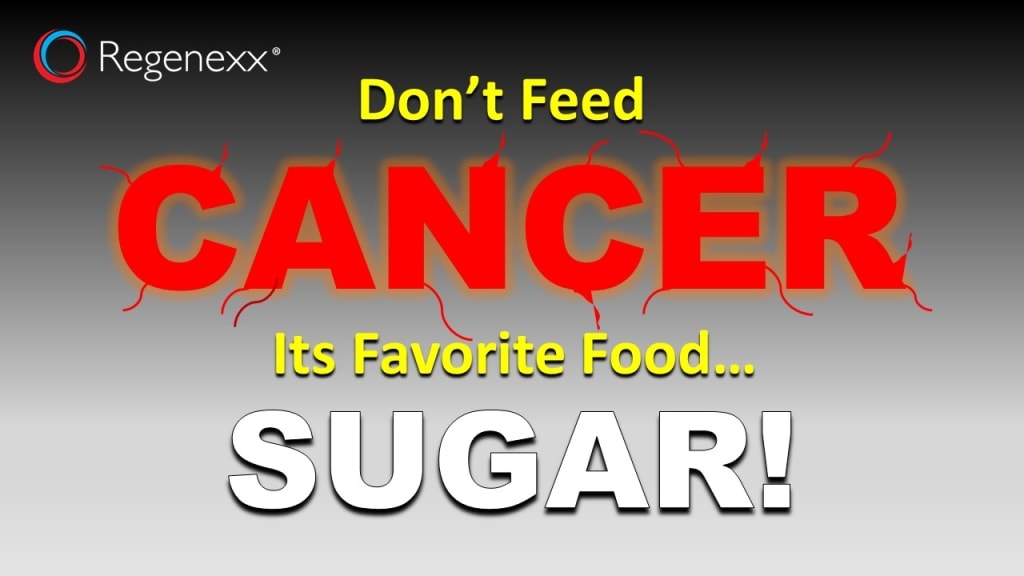Sugar Is Cancer’s Cellular Power Food
Does sugar fuel cancer? Cancer cells thrive on sugar. While normal, healthy cells might slowly nibble up sugar, grazing like cattle, cancer cells devour it, like a swarm of greedy flies gobbling up garbage. In addition, cancer rates in America are higher in those who are overweight, and one reason that number climbs on our bathroom scales is because of our sugar-happy American diets. Are you seeing the connection? If you are overweight due to an excess consumption of sugar, the obesity is putting you at a greater risk for cancer.
How, Exactly, Does Sugar Fuel Cancer Cells?
There’s a great deal of chemistry that goes into turning sugar into energy for cancer cells, so let’s break it down into the basics. There are two terms you need to be familiar with: glycolysis and PI3K (phosphoinositide 3-kinase).
Glycolysis is a complex metabolic process that breaks down glucose (the sugar in our blood) for cellular energy. More specifically, this means once we consume sugar through our food and our bloodstream absorbs it, the glycolysis process then turns it into the energy our cells need to perform their essential functions.
Though PI3K sounds a bit like a droid right out of Star Wars, it is, in fact, a group of enzymes that contributes to cellular growth, division, movement, and other functions. A new study shows that the “PI3K pathway regulates multiple steps in glucose metabolism [glycolysis] and also cytoskeletal [the cell’s framework] functions, such as cell movement and attachment.” The problem is, mutations, or major changes, in the PI3K pathway are common in cancers such as breast (women), endometrial, brain, and ovarian.
So it’s this activation of mutated PI3K during glycolysis, that process of breaking down the sugar, that eventually results in the fueling of the cancer cells.
How Cancer Happens
We have mutated cancer cells that pop up every day in our bodies, more as we get older. In addition, if you’re genetically prone to cancer, you have even more. Your body’s immune system does a good job of eliminating these cells every day. Think of the start of cancer as either too many bad cells for your body to handle or a weakened immune system that removes fewer of them. Hence, when the average American consumes sugar with wild abandon, he or she is providing a Petri dish perfect for cancer cells, increasing the odds that the cancer cells that happen every day in the body will grow out of control and become too frequent and numerous for the immune system to kill off.
Cut the Fuel Supply
If you know you are prone to cancer, especially if you are overweight, cutting off that fuel supply and eliminating the ability for sugar to fuel cancer is imperative. The fact is, eliminating the sugars, particularly those processed, added sugars, that we are learning fuel not just cancers but a whole host of chronic diseases and conditions will provide you with a better quality of life, help you feel better, and allow you to keep your weight manageable.
A Sugar by Any Other Name…Will Likely Still Raise Blood Glucose
Unfortunately, our food industry doesn’t make it easy for us to figure out if our foods contain sugars, and just when we think we have it figured out, names are changed or more names are added. For example, we all know high-fructose corn syrup is very bad for us, but did you know it can be labeled under other names (e.g., inulin, fruit fructose, glucose-fructose, etc.)? No matter what we call sugar, most are still going to raise our blood glucose, which will then go through that metabolic process of glycolysis.
Below is a nonexhaustive list of many other terms you need to watch for on labels if you are trying to eliminate or control sugars:
- Table sugar (glucose and fructose)
- High-fructose corn syrup (Inulin, crystalline fructose, glucose-fructose, etc.)
- Dextrose
- Maltose
- Other “-ose” suffixes on labels
- Malt syrup
- Invert sugar
- Cane juice
- Cane sugar
- Maltodextrin
- Barley malt
- Caramel
- Anything with “fruit juice” (dried fruit juice, fruit juice syrup, etc.)
- Agave
Also watch for carbohydrate counts on labels as these, too, turn to sugar in the blood. Limiting carbohydrates and only getting them from whole, natural, unprocessed food sources is a good way to cut back on sugar intake.
The upshot? Does sugar fuel cancer? Sugar is cancer’s power food, and cancer cells love a good sugar binge. We also know obesity or being overweight can increase the risk of cancer. Some of the cancers linked to being overweight include pancreatic, endometrial, breast, and colon. Whether you have cancer or are overweight or both—or you just consume a lot of sweets—it’s never too late to work on controlling your sugar intake.

If you have questions or comments about this blog post, please email us at [email protected]
NOTE: This blog post provides general information to help the reader better understand regenerative medicine, musculoskeletal health, and related subjects. All content provided in this blog, website, or any linked materials, including text, graphics, images, patient profiles, outcomes, and information, are not intended and should not be considered or used as a substitute for medical advice, diagnosis, or treatment. Please always consult with a professional and certified healthcare provider to discuss if a treatment is right for you.

